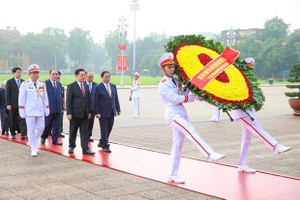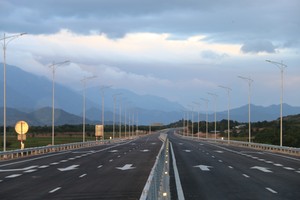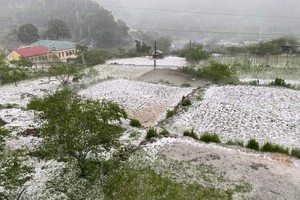Prime Minister Nguyen Tan Dung yesterday said he was optimistic that the country was on track to achieve higher economic growth in 2014, at around 5.8 per cent, and said measures to extend the budget deficit would not cause high inflation.
The PM was the final person in the cabinet after four other ministers fielded questions in the National Assembly general session, which is scheduled to end today. The session was broadcast live across Viet Nam.
PM Dung said the Government would continue applying measures to maintain economic growth and keep inflation at an appropriate level.
In his report yesterday, the PM said inflation would level at 6.3 per cent this year, the lowest level in the past decade, and noted that important progress had been made in forecasting and preparing for natural disasters.
The head of the Government also thanked the NA for supporting the plan to extend the State's budget deficit to 5.3 per cent of GDP in 2014, which will see VND170 trillion (US$8 billion) in Government bonds issued.
"We will strive our best to make sure that all of the state funding is effectively used," Dung said.
"Extending the state budget deficit will allow us to complete critical infrastructure projects, invest in agriculture, initiate capital construction and ensure social welfare."
Dung praised the decision, saying the current level of public debt was within an acceptable range and should not exceed the ceiling of 65 per cent of GDP in 2016, stressing that pressure to manage public debt and public spending was high.
Addressing dangerous cases of floodwater discharge in the Central region last weekend, Dung said the Government was trying its best to ensure safer management of reservoirs.
"Currently, we have around 7,000 water reservoirs, with some of them built 30-40 years ago. This can can be quite unsafe. We have requested local governments and agencies at all levels to reassess conditions and provide upgrades if needed," he said.
Assistance for residents relocating as a result of hydro-power projects also attracted concern from NA deputies. The PM said the Ministry of Agriculture and Rural Development was working on a plan to support poor residents in resettlement areas.
These policies will also be applied to new hydro-projects in 2014, he added.
Around 248 hydro-pojects are awaiting approval, with the Government taking cautious steps to reassess the need for the facilities, said Dung.
All contractors working on hydro-power projects will be required to meet regulatory standards on the management reservoirs to ensure a greater level of safety for the public.
Operators will be required to meet the new benchmark before the project commences operations, according to the PM.
"This is part of our effort to build renewable energy but we have to be extremely careful," Dung said.
In his question and answer session, the PM also updated NA deputies on the Government's efforts to speed up the release of legal instructions for the implementation of new laws.
He added that the Government was also monitoring the development of oil refinery projects across the country.
Judge questioned
Chief Judge of Viet Nam's Supreme Court Truong Ho Binh yesterday faced questions on incorrect court verdicts, highlighted in the case of Nguyen Thanh Chan.
Deputy Ngyen Ba Thuyen from Central Highland Lam Dong Province and Deputy Le Thi Nga from northern Thai Nguyen queried the responsibility of the ministry in the case where the 52-year-old man was sentenced to life in prison in 2004 for murder, before the real culprit turned himself in to police in October of this year.
The Chief Judge admitted that wrong verdicts had been handed down and agreed that wrongful sentences to life or the death penalty were unacceptable. He also said that incorrect sentences were possible in any justice system in the world and that mistakes were not exclusive to Viet Nam.
"In the case of Chan, only further investigations could resolve whether the verdict was wrong or not," Binh said, adding that the case was now being re-investigated.
Deputy Nga also alleged that the People's Supreme Court, the People's Supreme Procuracy and the related investigating teams needed to take responsibility for the Chan case.
She also suggested cameras be used in all interrogations to prevent the use of force.
Chief Judge Binh said that even if force was used in interrogations, it would need to be proven, adding that it was very difficult to prove that force had been used.
Binh also fielded questions from deputy Thuyen on thousands of requests to revise court rulings, confirming the sector had completed more than 63 per cent of submitted requests. There are 4,000 requests yet to be addressed, he added.
"It is obvious that the quality of court judgments has been improved," he said.
Binh took aim at a small number of judicial staff, arguing it was necessary to improve the quality of judges in the court system. The statement follows a strategy compiled by the ministry to improve staffing quality by 2020.
Deputy Pham Xuan Thuong from northern Thai Binh Province asked about the lack of judges in Highland and southeast provinces leading to a strain on current judges.
Chief Judge Binh said the sector had tried to recruit additional judges in a bid to address the shortage, but had encountered significant difficulties.
"Young judges in big cities like Ha Noi or Ho Chi Minh don't want to work in these areas mainly because of social welfare and income policy," he said, urging that better policies were needed to attract more judges to those areas.
On the same day, Minister of Information and Communications Nguyen Bac Son continued a Question and Answer session, focusing on the management of mass media, mobile phone SIM cards and online games.
Son said the ministry had completed media plans which had been submitted to the Prime Minister for approval. The media planning will re-arrange the country's mass media with a focus on improving quality standards.
Meanwhile, media offices will be required to become independently run by 2020 with State support only guaranteed for rural publications and those necessary to the State and Party's communications.
Broadcast journalism will also undergo a restructure with limitations on broadcasting foreign content and focus on developing home-grown programming.
Fielding questions from Deputy Don Nguyen Thuy Trang from HCM City on journalistic standards, Son said the ministry would co-ordinate with media agencies to prevent such violation.
Meanwhile, Deputy Tran Quoc Tuan from southern Tra Vinh Province questioned measures to manage prepaid SIM cards, often criticised for providing inadequate information from suppliers. Minister Son said the ministry had examined the issue in an effort to tackle violations.
Addressing the concerns of some deputies on online gaming management, Minister Son announced the ministry would co-operate with the Ministry of Culture, Sports and Tourism, the Ministry of Public Security and the State Bank to implement stricter controls on online game stations.
Justice Minister Ha Hung Cuong also answered questions about the withdrawal of the draft law on Information Access from the NA's session, saying parts of the law had been overly complex and impractical.
The Ministry of Justice has been asked to research the issue and submit findings to the NA in future.
























